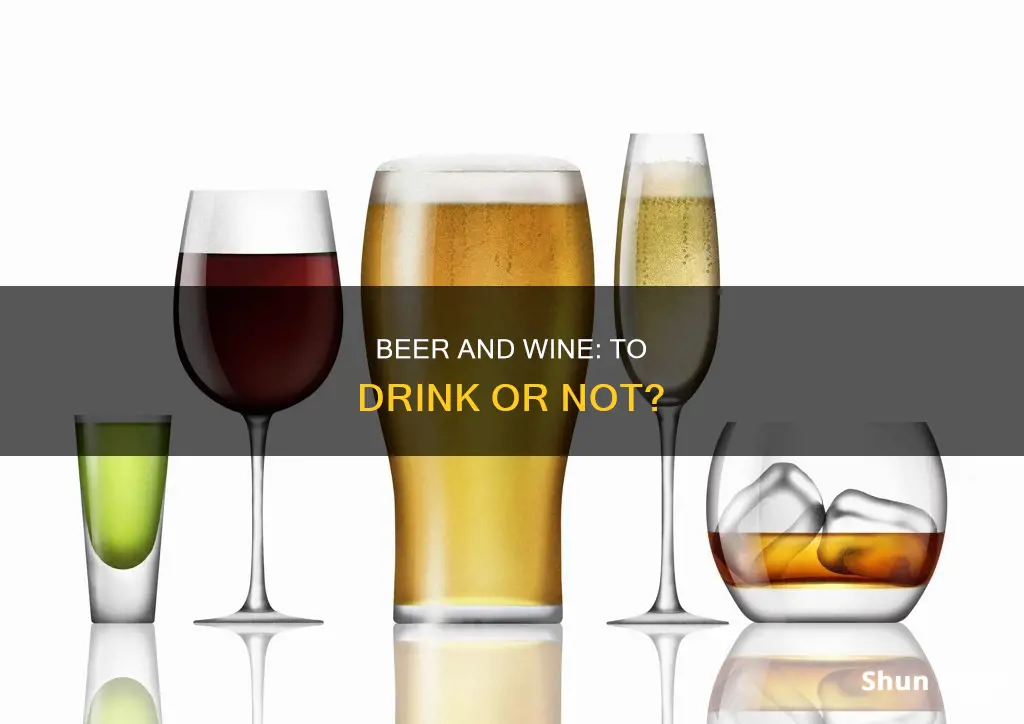
There are many old sayings about the order in which you should drink beer and wine. For example, beer before wine and you'll feel fine; wine before beer and you'll feel queer. However, researchers at Witten/Herdecke University in Germany and the University of Cambridge in the UK have debunked this myth. They found that drinking order has no effect on the magnitude of a hangover. Instead, the amount of alcohol consumed is the main factor that influences how you will feel the next day.
| Characteristics | Values |
|---|---|
| Speed of inebriation | A glass of wine will get you drunk faster than a pint of beer. |
| Calories | A pint of beer has 50% more energy content than a small glass of wine. |
| Weight gain | Studies suggest that moderate drinkers of wine or beer are not likely to put on weight in the short term. |
| Hangover | The order of drinking beer and wine does not affect the intensity of a hangover. |
| Health benefits | Red wine has more health benefits than beer. |
What You'll Learn

Beer before wine, you'll be fine
"Beer before wine, you'll be fine; wine before beer, you'll feel queer" is a well-known saying. However, a study by researchers from Witten/Herdecke University in Germany and the University of Cambridge has found that it is a myth. The study involved 90 German students between the ages of 19 and 40, who were divided into three groups and given alcoholic drinks in various orders. The researchers then analysed how the students felt the next day and concluded that the hangovers suffered by participants were equally bad, regardless of which form of alcohol they had consumed and in which order.
The study found that drinking too much alcohol will result in feeling bad, regardless of the type of alcohol or the order in which it is consumed. The only reliable way to predict how bad a hangover will be is by how drunk a person feels and whether they vomit. The researchers also found that individual factors such as age, sex, body weight, and drinking habits did not help to predict hangover intensity. However, they did find that women tended to have slightly worse hangovers than men.
The saying "beer before wine, you'll be fine" is often heard in the UK, and there are similar variations in French and German. However, in North America, the saying is often reversed, with people believing that drinking beer after wine is more likely to result in a hangover. Despite these popular beliefs, the study found that the order of drinks did not have an impact on the severity of hangovers.
While the study focused specifically on beer and wine, it is important to note that previous studies have found that some types of alcohol, such as dark spirits and drinks with more congeners, may make hangovers worse. Additionally, it is always important to drink responsibly, never drive under the influence, and know when to quit.
Understanding Beer Strength: Standard Drinks in Mid-Strength Beer
You may want to see also

Wine before beer, you'll feel queer
"Wine before beer and you'll feel queer" is a well-known saying that has been around for a long time. It is often used to advise people on how to avoid a hangover, with the suggestion being that drinking wine before beer will lead to a worse hangover than drinking beer before wine. However, scientific studies have shown that this saying is not based on fact.
The origin of the saying likely comes from the class differences in drinks. Historically, wine was associated with the wealthy, while beer was the drink of choice for the poor. So, the saying could be interpreted as: "wine after beer is an upgrade in wealth, but the other way around means your life just became total crap".
Despite the saying's lack of truth, hangovers are a real issue for many people and can have negative consequences such as reduced productivity and impaired performance. So, it is important to drink responsibly and in moderation.
There are many other similar sayings that exist in different cultures and languages, such as the German saying: "Wein auf Bier, das rat' ich Dir -- Bier auf Wein, das lass' sein", which translates to: "Wine after beer, I recommend to you -- beer after wine, leave it". In English, there is also the saying: "Beer before liquor, never been sicker; liquor before beer, never fear".
While the order of drinks may not matter in terms of hangover severity, other factors such as vomiting, perceived drunkenness, gender, and the amount of alcohol consumed do influence the intensity of a hangover. So, it is important to pay attention to these "red flags" when drinking and to always drink responsibly.
Drinking Beer on a Boat: Ontario's Laws
You may want to see also

Beer is less likely to lead to embarrassment
However, this is not always the case. Some people find that drinking beer after wine will torture them and give them a terrible hangover. Others find that drinking wine after beer will make them feel unwell.
There is a saying in the West Country: "Beer on cider makes a good rider, cider on beer makes you feel queer", meaning that it is okay to drink beer after drinking cider, but drinking cider after beer will make you sick. There are similar sayings in Hungary, the Netherlands, Romania, and the UK. The American saying goes: "Beer before liquor, never been sicker; liquor before beer, in the clear".
Recent research has found that drinking too much of any alcoholic drink is likely to result in a hangover, and that the order of drinks does not matter.
Beer and Flagyl: A Safe Mix?
You may want to see also

Wine may be better for your health
Wine, especially red wine, has long been considered to be healthier than beer. This is due to the presence of polyphenols, including flavonoids, which are found in higher quantities in red wine than in white wine. These substances are believed to relax blood vessel walls and prevent the oxidation of low-density lipoprotein ("bad" cholesterol), thereby reducing the risk of cardiovascular disease. Resveratrol, a type of polyphenol found in red wine, has been linked to a range of health benefits, including reduced ageing effects and protection against harmful UV rays.
Some studies have suggested that drinking wine, particularly with meals, offers more cardiovascular benefits than drinking beer or spirits. International comparisons have shown a lower prevalence of coronary heart disease in "wine-drinking countries" than in countries that prefer beer or liquor. Additionally, moderate wine consumption is a component of the traditional Mediterranean diet, which is associated with lower rates of disease and mortality.
However, it is important to note that the health benefits of wine may be overstated. For example, a 2006 study found that wine drinkers tend to buy more fruits and vegetables than beer drinkers, suggesting that their healthier diet, rather than their wine consumption, may be responsible for their reduced health risks. Additionally, the American Heart Association advises that a healthy diet is more important for reducing cardiovascular risk than alcohol intake, and the Dietary Guidelines for Americans 2015-2020 do not recommend that non-drinkers start drinking alcohol for health reasons.
Furthermore, some studies have found that beer can also provide health benefits. Beer contains phenolic compounds similar to those found in red wine, including quercetin, epicatechins, and gallic acid, which may contribute to heart health. A study in the American Journal of Clinical Nutrition found that hoppy beers can increase bone mineral density, and another study suggested that hops may inhibit obesity. Additionally, craft beers may contain more healthful constituents than non-craft beers, including plant compounds, yeasts, bacteria, vitamins, and minerals.
In conclusion, while wine, especially red wine, has been associated with various health benefits, it is important to consider other factors such as overall diet and lifestyle. Beer can also provide some health benefits, and the specific type of alcohol consumed may be less important than the amount consumed and individual drinking patterns. As always, moderation is key when it comes to alcohol consumption, and it is important to weigh the risks and benefits for your own situation.
Mixing Vyvanse and Beer: Is It Safe?
You may want to see also

Beer and wine have similar effects on weight gain
Alcoholic drinks are high in calories and can affect hormones that control appetite, hunger, and stress. The calories in alcohol are "empty," meaning they contain little to no beneficial nutrients or minerals. Alcohol may also increase abdominal fat, also known as a "beer belly." However, this is more common in men than in women.
Heavy drinking is defined as more than three drinks per day or seven drinks per week for females and more than four drinks per day or 14 drinks per week for males. Regular heavy drinking may lead to weight gain over time. Additionally, individuals who drink moderate amounts of alcohol frequently may enjoy a healthier lifestyle that protects them from weight gain.
To control weight, it is not necessary to give up alcohol entirely. Instead, drinking in moderation is recommended. This means consuming no more than one drink per day for females and no more than two drinks per day for males. Opting for low-calorie drinks, such as light beer, and avoiding mixed drinks with a lot of liqueur, juice, and syrup can also help.
DayQuil and Beer: A Safe Mix?
You may want to see also
Frequently asked questions
No, this is not true. A study by researchers at Witten/Herdecke University in Germany and the University of Cambridge in the UK found that the order in which you drink alcohol does not impact the severity of your hangover.
Yes, in a study by Mack Mitchell at the University of Texas Southwestern Medical Centre, it was found that a glass of wine will get you drunk more quickly than a pint of beer.
It depends. While a pint of beer has 50% more energy content than a small glass of wine, a recent review of studies concluded that neither wine nor beer drinkers tend to put on weight over the short term.
No, wine, especially red wine, has more health benefits than beer. Red wine contains polyphenols, which provide health benefits such as reducing the risk of heart disease, high blood pressure, and diabetes. Beer also contains polyphenols and offers modest health benefits, but not as many as red wine.
There is no evidence to suggest that mixing beer and wine will make your hangover worse. However, it is generally recommended to start with the drink that has the lowest alcohol content and work your way up to avoid drinking too much.







